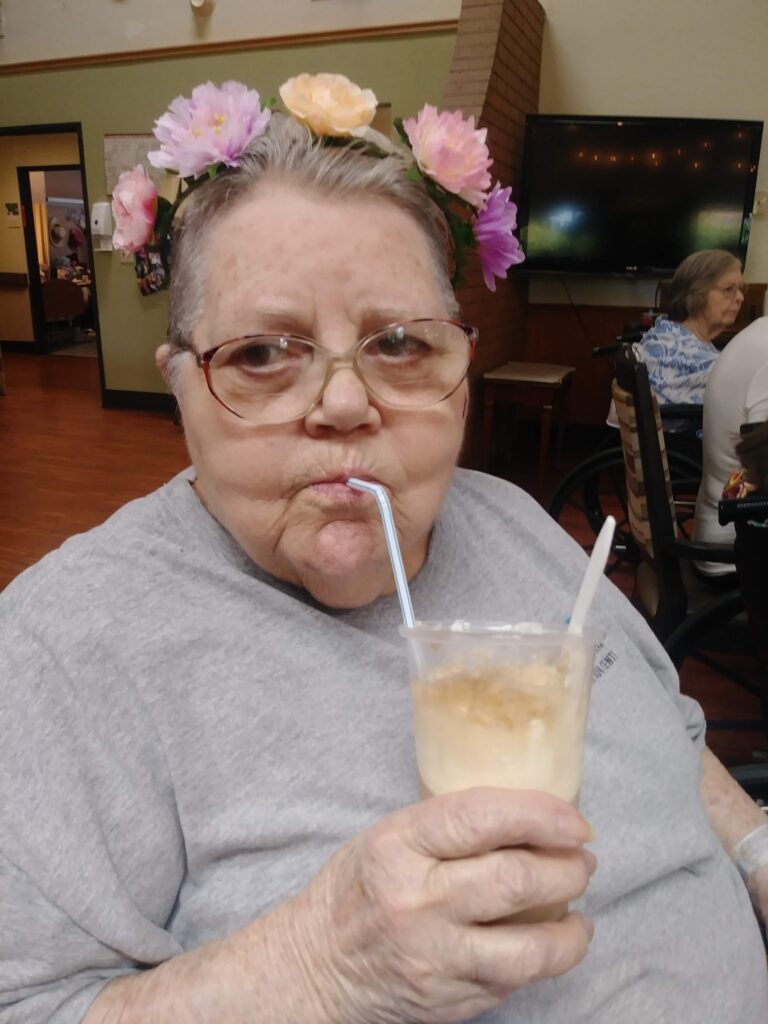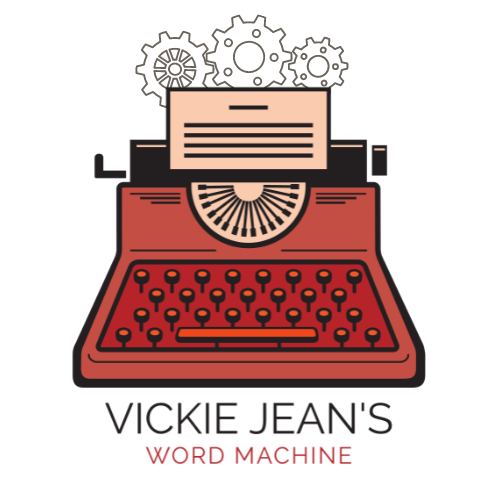
I sit outside in a rocking chair in the summer heat. I rock without meaning to, because that’s what you do in a rocking chair. The motion soothes me and I am grateful for what I can get. No other part of this day is soothing.
My elderly mother sits inside behind a window, drugged on antipsychotics and slumped in a wheelchair. We are at her nursing home, masked and socially distant, in the thick of Covid-19. This is our first window visit.
I haven’t touched my mom since March. I haven’t kissed her cheek or hugged her soft round body. I haven’t smelled her perfume, the old-lady kind that would be bad on anyone but her. Squinting into the glare of hot glass, I long for the cloying scent of gardenias, the moldy fog of rose petals. I’m reminded of a dried flower pressed between the pages of a book. If I hold it, it might fall apart.
I scoot closer to get a better look. Beyond the reflections of wind chimes and garden gnomes meant to make this place seem fun and getting old not so grim, there she is, asleep. My sweet mom. Deteriorating behind glass during a global pandemic.
There’s nothing I can do about it.
I heard about her hallucinations over the phone, wedged between things like a weather report. We were quarantined and things were already strange, but as this pandemic has taught me, there can always be more. “There’s a dead cat on my bed,” she said. Did she mean her stuffed kitty, the one that sits on her pillow? Maybe her eyesight was going. “No,” she said. “A real dead cat.”
In our calls over the next few weeks, dead animals turn into people with guns and then a man hiding in her closet. I listen and feel my stomach fall, leaving a sour hole. I look at my face floating on the greasy screen of my cell phone, a dumb woman with her mouth open, someone who is of no help to me.
I try to comfort mom with words, hollow phrases delivered on poorly executed video chats. Don’t worry mom. None of it’s real. Her phone lay on her lap, placed there by the nurses, and I watch as her eyes scan the room. The phone slips and she slides out of frame. I tell the ceiling tiles that everything is going to be okay.
The doctors say things like dementia, idiopathic, Lewy Body. The last sounds like nonsense, obscene baby talk. But no, Google assures me, just the German neurologist and those pesky protein deposits that keep the brain from functioning normally. Lewy Body Dementia shows up suddenly, inexplicably. It’s what Robin Williams had at the time of his suicide. There is no treatment, only management of symptoms.
“How do we know she has it?”
“We can’t be sure.”
Mom was always difficult to define.
I’ve never known how to describe her. “Special” was a possibility but I couldn’t stomach its faux flattery, its spine of condescension. “Slow” was what the doctors said when mom was late to speak. “Retard” was what the kids yelled when she showed up at school with my lunch. I learned to be organized, to not forget things.
Words failed us, but language was never our thing anyway. Our connection was sensory. When I was little, I rode on the back of her bicycle in a red plastic seat. I can still see her wide back, rising and falling inches from my face as she pedalled. I napped through our rides, smelling her sweat and dandruff shampoo as I dreamed.
We fell often, startling crashes that would snatch me from sleep. I’d open my eyes, still strapped to my seat but flat on the concrete. Mom would rush to lift me so she could see if there was any blood, any visible signs that I was hurt.
“Vickie!” she’d holler, her voice ringing through the neighborhood. I’d hide my face. Even a child knows when to be embarrassed. “Vickie! Are you okay!” I was okay, always okay somehow, but she made me promise not to tell grandma, who would take her bike away and stop our rides. Neither of us wanted that.
Today’s term is “intellectual disability,” which still lacks the descriptors to satisfy me. What means shame and love? Is there such a word? I resented her disability. I resented that she couldn’t teach me things or give me advice or do any of the countless things other mothers could do.
I resented that I never knew my father, a drunk she met at a bar, with whom my grandma forbade further contact. There’s a picture of me as a toddler being held by a blonde man at a pizza parlor that I study for clues. Mom is in the background, her round face floating in the dim background like a moon. She looks lost.
I wasn’t ever really her child. I was her playmate, then her sibling, and finally her parent, the adult in the room when grandma, who took care of us, was at work.
When I left for college, mom was in the garage listening to her transistor radio. We waved, neither of us overcome with emotion. I was eager to focus on myself, to shed my parental duties. She was busy petting her cat. I wasn’t worried because grandma was there to watch her.
When grandma died, I had graduated college and was living with my boyfriend in a different town. My older sister, who I was never close to, helped her settle into a new life. Mom moved into a senior apartment complex. She received a monthly check from the government and learned how to pay her own bills. She seemed happy, in her sixties and living away from her mother for the first time.
I learned all of these details from a phone, even though I could have visited. At that time, I kept my distance, a choice that seems absurd to me now that my choices have been taken away. I was still happy for her, vaguely proud like you are of an acquaintance who gets a promotion. Good for her, I thought, but didn’t investigate further. I was relieved she was making it on her own.
Then she fell in a crosswalk and broke her knee, an injury that ended her independence. My sister made it clear it was my turn to help. I returned to empty out her apartment and move her into the nursing home. Mom was devastated and kept talking about how it would be temporary. I didn’t argue, hoping she would get used to this change she didn’t ask for or see coming.
I filled the apartment’s dumpster with twelve years of my school photos, big ones in wooden frames. I couldn’t imagine how she lugged the archive of my life around with her all those years. I kept a few and hung them in her new room, which she shared with a woman who needed a machine to lift her out of bed.
I was middle-aged by then, happily married and childless by choice. I made a good life for myself but suffered from a nagging melancholy, a hole I filled for years with denial that I had a mother who needed me, but now filled with guilty visits to the nursing home. I had appeared out of nowhere and changed my mom’s life, and now it was my turn to be resented.
I kept coming and she softened. We hugged when we ran out of things to say. I was surprised that the scent of mom’s hair made me weepy and remember that this odd person wasn’t so odd. I had lived inside her body and my body knew it. She was my mom, even if she wasn’t the one I thought I deserved. And I was her daughter, even though I had disappeared.
Now there are no hugs, no touching. I send gifts through Amazon, the great savior of the pandemic. I order her a walkman, the old fashioned kind with headphones that plays cassette tapes. I actually find cassette tapes: Elvis, Queen and The Guardians of the Galaxy soundtrack, which has music my mom and I both like, songs that span the decades between us.
I buy a sleep mask made of grey silk and spray it with my perfume, citrus and cedar. I tell her to put the sleep mask on and turn up her walkman to drown out the hallucinations. These are the only things I have to offer, a sort of surrogate me that I’ve invented out of necessity.
The nurses say they do help her. She is often found in the hallway, masked in grey silk, blaring Heartbreak Hotel.
I usually stop by a car wash near the nursing home after our visits. It advertises as “touchless,” where only water comes into contact with the car. Nothing is damaged using such methods. The paint isn’t scratched, the plastic parts stay on, but I always find a sticky spot of sap or a dead bug stuck to a headlight. It doesn’t really get things clean. I continue to go because it’s better than nothing.
On the patio, behind the glass, mom is 79 years old. Her face is round and plump, a perpetual child, her brow smooth from a lifetime of people knowing better. I take in these details as she dozes. Like the rocking chair, this is an unexpected gift: a chance to see her unguarded, not trying to put on a brave face for me.
She wears a coral top and a headband of yellow daisies. Mom has taken to putting flowers in her hair. The young nursing assistants delight in accessorizing her in the morning and mom loves the attention. She wears bright lipstick, applied with a shaky hand, jagged lines of pink reaching for her nose and chin. Her red hair has grown past her ears, the roots wiry and grey, a reminder that there are no more beauty appointments. Such things have been suspended as we focus on survival.
She holds a giant teddy bear on her lap, a gift from the family of another resident. “This is my new bear,” she says.
“That’s a cool bear,” my husband says. “What’s his name?”
“I don’t know yet,” mom says. “He hasn’t told me.”
She hugs the bear, her arm pressing into his soft round body. Her smile lifts the drugged, slack face I’m trying to get used to, the one courtesy of the Seroquel, into my mom’s face, the one I love. I am glad she has something to hug.
She pauses, thoughtful.“He opens his mouth and I feed him cookies.”
Another hallucination. But a nice one, the first that holds any comfort.
Mom is getting tired and we say our goodbyes. We press our hands to the window and she leans forward, slowly and with great effort, her fingertips grazing the window pane. I see her wrinkled skin smooth into white bone under the glass for a moment. It reminds me that this is real, and she is real, even though I’m wearing a mask and she’s behind glass. I squeeze my own hand, the small bones inside reassuringly solid.
The teddy bear topples from her lap and, surprisingly quick, she catches him by a brown furry arm. He hangs from her grasp, dangling above the floor.
“Hold onto him, mom” I say. “He seems like a good one.”
